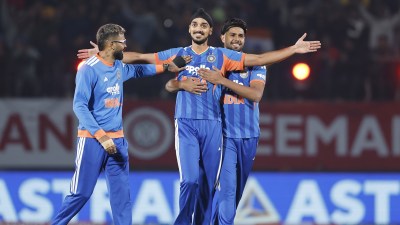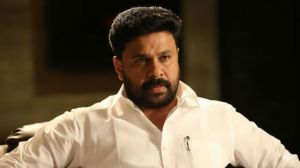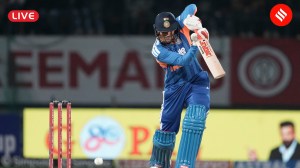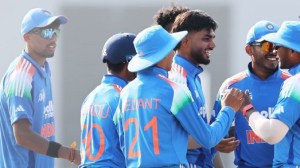Caught in ‘Sanatan Dharma’ row, INDIA parties search for idiom, language to navigate minefield
Some Congress leaders worry Udhayanidhi Stalin's remarks may hurt chances "in the Hindi heartland”; last year, Rahul Gandhi underlined how Congress "has been attacking the social system of the country” through legislation such as RTI and MGNREGS
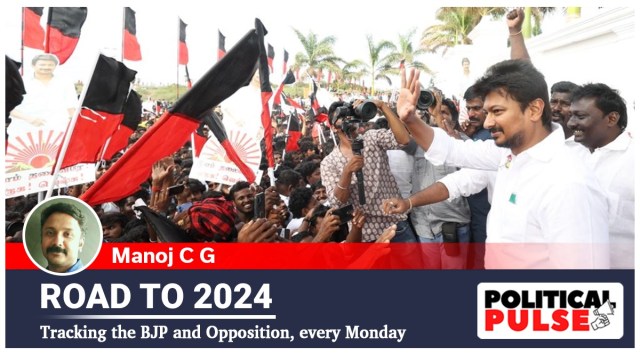 Several Opposition leaders in private and some openly have said they disagree with and disapprove of Udhayanidhi’s exposition. But the apprehension is more about the electoral impact. (File)
Several Opposition leaders in private and some openly have said they disagree with and disapprove of Udhayanidhi’s exposition. But the apprehension is more about the electoral impact. (File) DMK leader Udhayanidhi Stalin’s remarks on Sanatan Dharma and the BJP’s stinging criticism of the Opposition bloc have predictably upset many of the INDIA parties, even the Lohiate formations that have historically championed social justice and spoken about the emancipation of Dalits and so-called lower-caste groups, abolition of the caste system, and building an egalitarian society.
The DMK views Sanatan Dharma as a belief that propagates Brahminical Hinduism and divides people in the name of caste. The socialist parties, which derive their ideological moorings from Ram Manohar Lohia, share the same view but in a less forceful form. They have traditionally spoken the language of emancipation of the underprivileged, deprived, and weaker sections, including Dalits, but do not share the antipathy Periyar E V Ramasamy Naicker had for the Hindu religion and its deities.
Lohia himself shared Periyar’s worldview when it comes to the annihilation of the caste system. But Lohia who was more practical and in tune with the Hindi heartland political landscape focused his attention more on the empowerment of backward castes through reservation. His famous slogan was “Sansopa (Sanyukta Socialist Party) ne baadhi gaanth, pichhade paaven sau mein saath (Sansopa has resolved backward castes should get 60% of the total reservation)”.
The followers of Lohia — divided into various parties such as the Samajwadi Party, Rashtriya Janata Dal, and the Janata Dal (United) in the Hindi heartland — took forward their social justice mantra. There was a realisation that they would have to work around the caste divide and create a backward caste vote bank for practical, electoral reasons. The Bahujan Samaj Party in its early days under Kanshi Ram positioned itself as a strident, radical Dalit party opposed to Manuvadi forces but moved from Kanshi Ram’s Bahujan Samaj to Sarvajan Samaj under Mayawati. “Even the BSP that began with the slogan ‘tilak, tarazu aur talwar, inko maro joote chaar (hit the symbols of upper castes with slippers)’ eventually changed its slogan to ‘haathi nahi Ganesh hai, Brahma Vishnu Mahesh hain (it’s not elephant but Ganesh)’ and ‘Brahman shankh bajayega, haathi badhta jayega (the Brahmin will blow conch shell, and the elephant will move ahead)’,” said a Congress leader.
In recent years, the SP and the BSP have also promised to build Parshuram statues and name infrastructure after the Hindu deity. “The socialist movement in north India and the Ambedkarite movement were against the caste system and untouchability. They were seeking the abolition of the caste system and at the same time seeking reservation for Dalits and the backward. Parallel to this was the movement by Naicker who virulently hated the caste system. They did not believe in Ram and neither accept the sovereignty of Hinduism nor Sanatan. We both sought the abolition of the caste system. Lekin hum kisike devi-devtaon ko gaali dene ke, joote maarne ke, ya apmaan karne ke paksh main nahin the na hai (We have never supported the abuse of someone’s deities or throwing shoes and insults),” said a senior socialist leader.
Another senior leader said, “Our worldview has been that in the Hindu caste system, some castes have become more privileged than others over thousands of years and others have remained either untouchable, underprivileged, or humiliated and that has to change.”
Several Opposition leaders in private and some openly have said they disagree with and disapprove of Udhayanidhi’s exposition. But the apprehension is more about the electoral impact.
“The BJP is trying to disproportionately propagate the statement and gain political mileage,” one leader said. But many leaders accept that the present generation of leaders perhaps does not have the language or the nuance to counter the BJP when it seeks to paint the Opposition bloc as anti-Hindu. “There is not much difference between them and us (DMK and the socialist parties). They have full hatred for Sanatan Dharma, which is seen by them as Brahmanical Hinduism and interpreted by the BJP differently whereas we have hatred for the caste system,” said one leader.
“Such statements should not have come at such a time … the propaganda machinery is in the hands of the BJP… hope the discourse will change in a few days. The cycle will keep changing. Within some days, it will be about ‘one nation, one election’ and the special session of Parliament. But one thing is clear, the coming election is going to be the most frenetic … emotionally, culturally, and religiously we all need to be careful,” another leader said.
For the record, the Congress did not castigate the DMK, a valuable ally. “Our view is very clear. Sarva Dharma Samabhava is the Congress ideology but you have to understand that every political party has their own freedom to tell their views. We are respecting everybody’s beliefs,” said Congress general secretary K C Venugopal.
Sanatan Dharma and Sarva Dharma Samabhava are different concepts. “We lack the idiom and language to explain the complexities of Sanatan Dharma,” said one Congress leader. A socialist leader said, “The Congress has basically been a Brahmin-dominated party for 50 years. That is why they find it difficult when it comes to articulating these things.”
Within the Congress, a section of leaders is worried. “It is going to hurt in the Hindi heartland … the overall population of the Brahmins in the heartland is not less than 13-14%. How can you isolate one caste? And they are influencers, holding positions, from birth to death. In the villages, the pandit plays a role … in fact, every community has a role. You can’t take a position against any caste,” said a senior party functionary.
West Bengal Chief Minister Mamata Banerjee also disagreed with Udhayanidhi. “I respect the people of Tamil Nadu and South India. But my humble request to them is to respect all as every religion has separate sentiments … I respect Sanatan Dharma and we derive our learnings from the Vedas … As far as the remarks (of Udhayanidhi Stalin) are concerned, he is a junior. I am not clear about why and on what grounds he has made the comment. I feel that each and every religion should be equally respected.”
But unsurprisingly, leaders from Tamil Nadu disagree. The criticism of Udayanidhi’s statement by the Shiv Sena (Uddhav Balasaheb Thackeray) — its leader Priyanka Chaturvedi criticised the comment — is not surprising given its deep-rooted ideological commitment to political Hindutva. But the Congress tightrope is interesting. In the recent past, both Congress president Mallikarjun Kharge and senior leader Rahul Gandhi spoke out against the Manusmriti. The Congress is fervently hoping that the issue dies down soon.
“The single-biggest attack on Manusmriti in Indian history is the Constitution of India … How does saying one man should get one vote equate with Manusmriti?” Gandhi said last year at an event in London.
Referring to the rural job guarantee scheme MGNREGS (Mahatma Gandhi National Rural Employment Guarantee Scheme) and the Right to Information (RTI) Act, he said “the Congress, through its actions, has been attacking the social system of the country”. Gandhi went on to say, “And it has done it throughout. We fundamentally believe that every single human being in India should be given the same rights and the same opportunities. India can only survive if you do that and if you stop doing that India will fragment.”
A few months ago, Kharge some months ago accused the BJP of worshipping Manusmriti and not the Constitution. On Monday, his son and Karnataka Minister Priyank said on the controversy generated by Udhayanidhi’s comments, “Any religion that does not promote equality, any religion that does not ensure that you have the dignity of being a human being is not a religion according to me. Any religion. Any religion that does not have equal rights and does not treat you as a human being is as good as a disease.”
- 01
- 02
- 03
- 04
- 05


